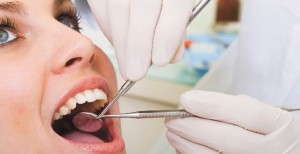By Village Dental –
 More than 26 million U.S. adults have diabetes. However, as much as 20 percent of these cases go undiagnosed, according to the American Diabetes Association. Allowing the condition to progress untreated may lead to a lower quality of life and other health complications. Oral complications are commonly found in individuals with uncontrolled diabetes, making the dental office an ideal location for early identification and appropriate referral for medical evaluation.
More than 26 million U.S. adults have diabetes. However, as much as 20 percent of these cases go undiagnosed, according to the American Diabetes Association. Allowing the condition to progress untreated may lead to a lower quality of life and other health complications. Oral complications are commonly found in individuals with uncontrolled diabetes, making the dental office an ideal location for early identification and appropriate referral for medical evaluation.
The next time that you visit your local dentist and they ask you to open wide for your exam, the dentist may find something more than a couple of unfilled cavities. A study conducted by the Columbia University College of Dental medicine states that routine dental checkups may help identify undiagnosed diabetes in its early stages.
The diabetes epidemic is continuing to grow at a rapid rate. While early diagnosis can help individuals resolve the condition quickly, few people are given this early warning. However, many of the earliest symptoms may be apparent to dentists.
The Connection Between Gum Disease and Diabetes
Research shows that there is an increased prevalence of gum disease among those with diabetes, adding serious gum disease to the list of other complications associated with diabetes, such as heart disease, stroke and kidney disease. Patients with diabetes are at least two to three times more likely to develop periodontal disease than non-diabetics, and should be advised to visit their dentist regularly for full evaluation of their dental and periodontal condition.
The more severe form of gum disease is called periodontitis, at this stage, pockets form when the gums begin to pull away from the teeth. These pockets fill with germs and deepen. When this happens, scaling and root planing are required to save the teeth. If nothing is done, the infection goes on to destroy the bone around the teeth, causing them to become loose and may even fall out or need to be pulled.
In addition to gum disease, diabetes also makes people more susceptible to:
- Sore or loose teeth
- Fungal mouth infections
- Mouth ulcers
- Dry mouth
- Cavities
People with diabetes who have good control of their blood sugar are less apt to develop these problems.
Does the Connection Go Both Ways?
Emerging research suggests that the relationship between serious gum disease and diabetes goes both ways. People with diabetes are more likely to have periodontal problems, possibly because people with diabetes are more susceptible to contracting infections. In fact, periodontal disease is often considered one of the major complications of diabetes. Interestingly, the relationship between the two conditions goes both ways; just as diabetes can increase a person’s chance of developing periodontal disease, research suggests that efficient and effective periodontal hygiene may positively affect blood sugar levels. On one hand, because of lowered resistance and a longer healing process, gum disease appears to be more frequent and more severe among those with diabetes. Conversely, it appears that treating gum disease in people with diabetes can help improve blood sugar control.
Diabetes is quickly becoming an increasing problem all around the world. Early detection is one of the only ways to decrease the side effects of this disease from taking its course. The researchers at Columbia University have certainly been able to identify an unconventional way to diagnose this disease when it is in its earlier state. Diabetes is a well-established risk factor for periodontal disease, and dentists commonly treat patients who either have diabetes or are at increased diabetes risk due to obesity, family history of diabetes, hypertension, sedentary lifestyle and other factors.
Your teeth and gums can say a lot about how you live your personal life and believe it or not; a dentist may be able to detect health concerns before a doctor just by looking at your dental hygiene. Sometimes your dental hygiene can indicate serious issues that may be occurring as well as health choices that should be improved in order to better your oral and overall health. The Surgeon General’s Report on Oral Health states that good oral health is integral to general health. So be sure to brush and floss properly and see your dentist for regular checkups.
Village Dental
352-205-7667 or 352-753-7507
 Central Florida Health and Wellness Magazine Health and Wellness Articles of the Villages
Central Florida Health and Wellness Magazine Health and Wellness Articles of the Villages



